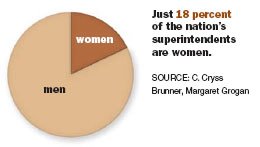Why Isn't There Pressure To Hire More Minority Female Superintendents?
 It's getting to be superintendent hiring season, and EdWeek has a worthwhile article on the lack of black, female superintendents across the nation -- a handful of whom have resigned or been forced out in recent weeks.
It's getting to be superintendent hiring season, and EdWeek has a worthwhile article on the lack of black, female superintendents across the nation -- a handful of whom have resigned or been forced out in recent weeks.Even discounting the recent resignations, it seems there are challenges both to being black and -- perhaps even more so -- to being a woman running a major school system.
What's missing is any sense of momentum around addressing the situation, or any public pressure from the public or the press on districts to change it or at least consider qualified minority candidates (like there is for minority sports coaches, for example).
Some pundits like AEI's Rick Hess don't even think there's a problem.
READ MORE>>
Just 18 percent of superintendents are women, according to EdWeek (Race, Gender, and the Superintendency).
The advantages of being a woman and a minority superintendent would seem to be relatively minor, given the generally white, male nature of most of the senior administrators, business leaders, and elected officials that a superintendent has to deal with.
This makes the comments attributed to AEI's Rick Hess seem naive at best: Hess rejects the notion that being black and female affects urban superintendents “in any predictable or straightforward way,” or that they are “a systematic handicap."
According to the article, "A black superintendent’s race might well provide an advantage a white leader would lack in trying to build connections with a city’s racial and ethnic minorities, Mr. Hess said."
Come on, now, Rick. Get real.

0 Comments:
Post a Comment
<< Home